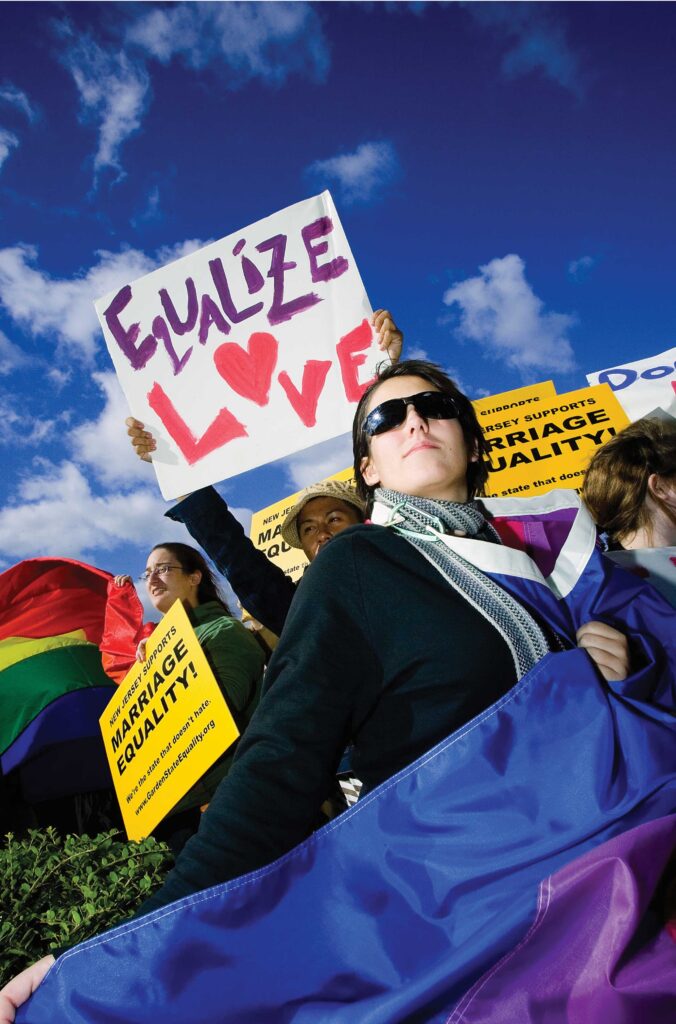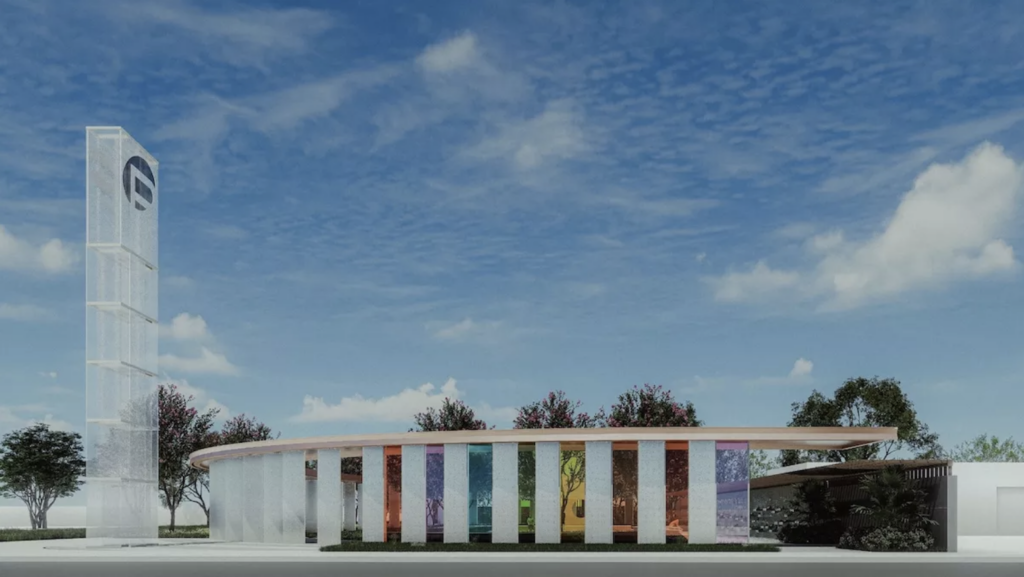Engaged To Equality

Where we stand in the fight for same-sex marriage rights.
Domestic partnerships? Civil unions? Legal Marriages in Massachusetts? While it’s commonly known that full marriage rights continue to elude the gay community, the progress we have made in securing these rights has come in fits and spurts, leaving a mess of murky legal terminology in its wake. This article means to clarify the current legal status of same-sex marriage in America by outlining recent triumphs and setbacks, and by explicating Lambda Legal’s goals, both immediate and longterm.
The fight for marriage equality has made steady, nationwide progress in 2007. Not all gay couples wish to marry, but we must have the option to do so before we can be seen as equals. While Massachusetts is the only state that provides legal same-sex marriages, court and legislative victories across the nation are expanding protections for same-sex couples and their families. Slowly but surely, we are making the case for full marriage equality, and we are being heard.
The numbers tell a story of success, at least in the context of how civil rights have been won in this nation’s history. In November 2003, the Massachusetts Supreme Judicial Court ruled in Goodridge v. The Department of Health that same-sex couples must be given equal marriage rights under the state constitution. As gay visibility exploded across all areas of American culture, the landmark Goodridge ruling was followed in February by the decision of San Francisco Mayor Gavin Newsom to issue marriage licenses to same-sex couples in his city.
Based on data analyzed by the Williams Institute, roughly one-quarter of same-sex couples currently live in states where nearly all of the benefits of marriage under state law are available to them, albeit with discriminatory “less-than” labels outside of Massachusetts. If we fold in protections such as state-wide domestic partnerships, reciprocal beneficiaries and New York’s unique and widespread recognition of out-of-state, same-sex marriages, that fraction goes up to one-third. Even more encouraging is that most of these advances have been made in the last eight years.
‘07: Advancing Toward Equality
In February 2007, New Jersey’s civil union law took effect. Passage of that law followed a New Jersey Supreme Court ruling in Lambda Legal’s case for marriage equality, wherein the court ruled unanimously that same-sex couples must be treated equally under the law. But they left it to the state legislature to decide whether to honor the right to marry per se, or to create a separate status with all the benefits of marriage except its powerful name. The legislature opted for a separate status with a civil union law. Since then, about 2,300 couples have been joined in civil unions in New Jersey.
On the one-year anniversary of this bittersweet decision, the New Jersey Civil Union Review Commission released its first report asserting that the law falls short of providing equality, mainly because couples in civil unions are denied many of the same benefits routinely granted to same-sex spouses in Massachusetts. For example, those in civil unions are susceptible to loopholes that allow employers with federally funded health plans to deny spousal insurance coverage. The gay rights organization Garden State Equality has received hundreds of complaints of civil unions not being honored. The Review Commission also found that because civil union status is still largely unclear to the general public, it confers a second-class status. The term forces couples to waste time explaining it at banks and hospitals instead of just saying “that’s my wife,” and being understood. In the words of now-retired New Jersey Supreme Court Chief Justice Poritz, “Labels set people apart as surely as physical separation on a bus or in school facilities.” When it comes to marriage, a rose by any other name does not smell as sweet.
Marriage equality is now on the horizon in New Jersey. Senator Loretta Weinberg, who co-sponsored the civil union law, has publicly acknowledged its flaws, and plans to introduce a new bill legalizing gay marriage within the next few months. Governor Corzine has indicated he would sign it, and key legislative leaders have promised to support it.
Legislatures in Washington State, New Hampshire and Oregon have enacted laws that bestow selected marriage rights through a separate status of civil union or domestic partnership. Although these laws vary in the number of protections they provide, and are still discriminatory, they reduce the harms that same-sex couples and families face, and they set the stage for marriage equality through a series of hard-won advances. They demonstrate that elected officials and their constituents are learning more about the plight of same-sex couples and their children. It is in this way that discriminatory barriers begin to crumble. In Washington and Oregon, lawsuits that lost in court were nonetheless successful in helping to educate elected officials by bringing awareness to the struggle for equality through the plaintiff families, and by prompting public debate as the lawsuits wended their way through the courts.
Every battle for civil rights has its setbacks, hence a disappointing court decision in Maryland this year. In a divided opinion, the Maryland Court of Appeals upheld a state law that bars same-sex couples from marrying. On the upshot, advocates in Maryland are now working with the state legislature to promote the passage of a marriage equality law, benefiting from the educational impact that the lawsuit has had on the state.
One exciting development in 2007 was Lambda Legal’s victorious case on behalf of six same-sex couples in Iowa. A trial court declared that same-sex couples must be treated equally under the law. One happy couple made it through all the red tape and were legally married before the defendant in that case was granted a stay on the decision. Iowa has now seen its first same-sex married couple, and we are working to make sure all same-sex couples in Iowa who choose to marry are permitted to do so. The case is now on appeal before the Iowa Supreme Court, and Lambda Legal is fighting to ensure that the trial court’s decision is upheld.
Another breakthrough in 2007 has been New York’s widespread legal recognition of same-sex couples’ marriages (mostly from Canada). A lawsuit for marriage equality failed in court, but succeeded in terms of public opinion by influencing the first United States governor to propose a marriage equality bill, which has already passed one legislative house. Working in tandem with others, Lambda Legal has already had success in gaining respect for same-sex marriages from many municipal employers, private insurance companies, and the State’s retirement system. In one instance we had to sue a school district over benefits, but then the state agency that governed those benefits changed its policy, prompting over 800 public employers to provide benefits to same-sex spouses of employees. Anti-gay groups have sued to stop government officials from recognizing same-sex marriages, but so far our side has beaten them back. With New York State in our corner, we look forward to continued advancement.
Looking Ahead in ‘08
The Connecticut Supreme Court will soon issue a verdict in a case brought by Gay and Lesbian Advocates and Defenders (GLAD) on behalf of eight same-sex couples in that state. As this goes to press, we are preparing oral arguments in the California marriage equality cases, which are slated for March 4th. Lambda Legal is working alongside lead counsel National Center for Lesbian Rights and co-counsel American Civil Liberties Union. According to law, the California Supreme Court must issue a decision within 90 days of hearing oral arguments; so by June 2nd, we should have a decision. In both Connecticut (civil unions) and California (broad domestic partnerships), the courts will address the question left open by New Jersey and Vermont: is it really “equal” to provide marital benefits under a separate status imposed solely upon one group in the state? We argue that it is not. As we learned from Brown v. Board of Education, separate but equal is a contradiction in terms.
As the most populous state, California often sets the course for the rest of the country. For example, its landmark 1948 Supreme Court decision Perez v. Sharp was the first to overturn a law banning interracial marriage. Nineteen years later, the U.S. Supreme Court followed suit.
Iowa, too, has an inspiring history of taking the lead on civil rights regarding issues of both race and gender. Oral arguments before the Iowa Supreme Court in defense of Lambda Legal’s trial victory should take place sometime this year. Same-sex couples and their families are waiting for Iowa to stand up for equality so that they can have the same choices and protections as their neighbors.
At the moment, all eyes are on New Jersey and New York to see which state will be next to end discrimination in marriage.
Get Involved! Resource Directory
If you want to make a difference, contact your representatives and tell them you support marriage equality! The following organizations have great resources to help you get started:
Empire State Pride Agenda:
New York’s statewide lesbian, gay, bisexual and transgender civil rights and advocacy organization.
prideagenda.org
Equality California:
Equality California works for LGBT civil rights through an array of political strategies and empowering individuals to engage in the political process.
eqca.org
Freedom to Marry:
The gay and non-gay partnership working to win marriage equality nationwide brings new resources and a renewed context of urgency and opportunity to the movement. Excellent resources, news and support center on the website.
freedomtomarry.org
Gay and Lesbian Advocates and Defenders:
New England’s leading legal rights organization dedicated to ending discrimination based on sexual orientation.
glad.org
Garden State Equality:
New Jersey’s fast-growing organization has been relentless and groundbreaking in its campaign for marriage equality in the past three years.
gardenstateequality.org
Human Rights Campaign:
HRC strives to end discrimination through a grassroots force of more than 700,000 members and supporters nationwide.
hrc.org
Lambda Legal:
Lambda Legal is a national organization committed to achieving full recognition of the civil rights of LGBT people through impact litigation, education and public policy work.
lambdalegal.org
Marriage Equality New York:
An organization fighting to secure the right of all couples to enter into civil marriage through education and promotion of awareness.
marriageequalityny.org
National Gay and Lesbian Task Force:
The first national LGBT civil rights and advocacy organization remains the movement’s leading voice for freedom, justice and equality.
ngltf.org
The Wedding Party:
The Wedding Party is an all-volunteer, non-profit organization that supports and celebrates same-sex partnership, and educates the public on the need for marriage equality.
theweddingparty.org













